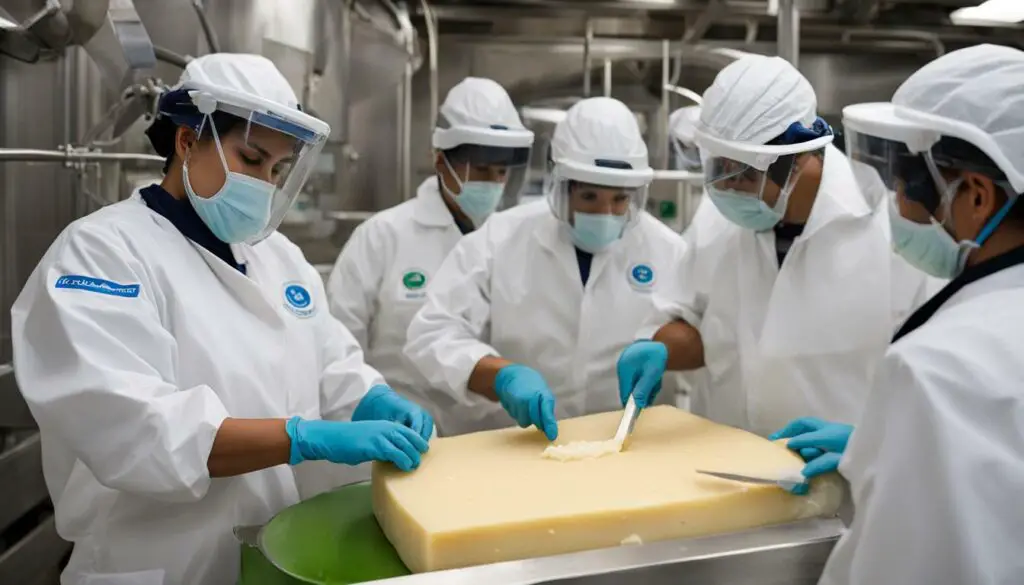Queso fresco, a traditional Mexican cheese, has gained popularity for its delicious taste. But is queso fresco healthy? In this section, we will explore the healthiness of queso fresco cheese and offer insights into its nutritional value and potential benefits.
Key Takeaways:
Contents
- 1 Nutritional Value of Queso Fresco: A Closer Look
- 2 Health Benefits of Queso Fresco: Exploring the Potential
- 3 Pros and Cons of Queso Fresco: Weighing the Options
- 4 Queso Fresco vs. Other Cheese Options: How Does It Compare?
- 5 Safety Precautions: Pasteurization and Listeria Concerns
- 6 So is queso fresco healthy?
- 7 Find out more about Queso Fresco
- 8 Can You Freeze Queso Fresco? Our Guide to Proper Storage
- 9 Oaxaca Cheese vs Queso Fresco: Unveiling the Delicious Mystery
- 10 Understanding Queso Fresco in English – A Cheesy Delight!
- 11 Queso Fresco Vs Feta: Unveiling the Cheesy Differences
- 12 Discover How to Store Queso Fresco with Our Easy Tips!
- 13 Unraveling the Mystery: Does Queso Fresco Melt?
- 14 Queso Fresco vs Mozzarella: Exploring Cheesy Differences
- 15 Finding the Perfect Substitute for Queso Fresco – Your Guide
- 16 FAQ
- Queso fresco is a traditional Mexican cheese made with raw cow’s milk or a combination of cow’s and goat’s milk.
- It is slightly salty and tangy in taste and adds a good balance to spicy dishes.
- Queso fresco contains 360 calories per cup of crumbled cheese and is high in calcium, protein, and vitamins A, B12, and D. Sources include USDA
- It is also a source of omega-3 fatty acids when made with organic milk.
- Pasteurization and refrigeration are important to consume queso fresco safely and avoid the risk of listeria infection.
Nutritional Value of Queso Fresco: A Closer Look
To determine whether queso fresco is a healthy option, it’s essential to understand its nutritional composition. This traditional Mexican cheese is made with raw cow’s milk or a combination of cow’s and goat’s milk, resulting in a slightly salty and tangy taste that adds a delightful balance to spicy dishes.
Queso fresco offers a range of macronutrients that contribute to its overall nutritional value. A cup of crumbled queso fresco contains approximately 360 calories, making it a moderate-calorie cheese option. It is also a rich source of calcium, providing around 400 milligrams per serving, which is essential for maintaining strong bones and teeth.
In addition to calcium, queso fresco is high in protein, offering approximately 25 grams per cup. Protein is crucial for building and repairing tissues, supporting muscle growth, and keeping you feeling satisfied after a meal. Queso fresco is also rich in vitamins A, B12, and D, which play vital roles in various bodily functions, including vision, red blood cell production, and bone health.
It’s worth noting that queso fresco made with organic milk contains omega-3 fatty acids, which are essential for heart health and brain function. These healthy fats are known to reduce inflammation and support cognitive function.

When consuming queso fresco, it’s important to prioritize safety. Pasteurization is necessary to eliminate harmful bacteria, ensuring the cheese is safe to consume. Additionally, proper refrigeration is crucial in preventing the growth of bacteria, particularly the risk of listeria infection.
Understanding the nutritional value of queso fresco allows you to make informed decisions about incorporating it into your diet. Whether enjoyed as a topping for tacos or as a flavorful addition to salads, queso fresco can provide a nutritious and delicious element to your meals.
Health Benefits of Queso Fresco: Exploring the Potential
Besides its taste, queso fresco has been associated with several health benefits that make it an attractive choice for many. This traditional Mexican cheese offers a range of nutrients that can contribute to overall well-being.
One of the key benefits of queso fresco is its high calcium content. Calcium is essential for maintaining strong bones and teeth, and consuming foods rich in this mineral, like queso fresco, can help prevent conditions such as osteoporosis. Additionally, queso fresco is a good source of protein, which is vital for building and repairing tissues in the body.
Queso fresco is not only delicious but also packed with nutrients that can support a healthy lifestyle. Its calcium content promotes strong bones, while protein aids in tissue repair. Additionally, the vitamins A, B12, and D found in queso fresco contribute to various aspects of our well-being.
In addition to calcium and protein, queso fresco contains important vitamins such as A, B12, and D. Vitamin A is essential for healthy vision and a strong immune system, while vitamin B12 supports brain function and the production of red blood cells. Vitamin D plays a crucial role in calcium absorption, ensuring that our bodies can effectively utilize this important mineral.
To enjoy the health benefits of queso fresco, it is important to consume it safely. Pasteurization and refrigeration are key steps in preventing the risk of listeria infection, making sure that you can enjoy this delicious cheese without compromising your health.
Discover the potential of queso fresco:
- Strong bones: Thanks to its high calcium content, queso fresco supports bone health and can help prevent conditions like osteoporosis.
- Protein power: With its protein content, queso fresco aids in tissue repair and supports muscle growth.
- Essential vitamins: Queso fresco contains vitamins A, B12, and D, which contribute to various aspects of our well-being, including vision, brain function, and immune support.
So, next time you enjoy the delicious taste of queso fresco, remember that you’re not just satisfying your taste buds but also providing your body with valuable nutrients that can promote a healthier lifestyle.

For individuals who are conscious about their weight, queso fresco may present itself as a potentially beneficial addition to their diet. This traditional Mexican cheese is not only delicious but also offers several qualities that can support weight loss goals.
First and foremost, queso fresco is relatively low in calories compared to other cheese varieties. With approximately 360 calories per cup of crumbled cheese, it can be a satisfying addition to meals without adding excessive calories. This makes it a suitable choice for individuals looking to manage their calorie intake while still enjoying the creamy and savory taste of cheese.
Additionally, queso fresco is packed with important nutrients that can contribute to overall health and well-being. It is high in calcium, which plays a vital role in supporting healthy bones and teeth. The protein content of queso fresco can also help promote satiety, keeping you feeling fuller for longer and potentially reducing overeating.
Furthermore, queso fresco made with organic milk contains omega-3 fatty acids, which have been associated with numerous health benefits, including weight management. These healthy fats can help regulate appetite and metabolism, potentially aiding in shedding pounds.
When incorporating queso fresco into your weight loss journey, it’s important to remember that portion control is key. While it can be a healthy addition to meals and snacks, consuming excessive amounts may hinder weight loss efforts due to its calorie content. By enjoying queso fresco in moderation as part of a balanced diet, you can savor its flavors while supporting your weight loss goals.

Pros and Cons of Queso Fresco: Weighing the Options
Like any other food, queso fresco has its own set of advantages and disadvantages that should be considered. Let’s take a closer look at the pros and cons of consuming this popular Mexican cheese:
Pros:
- Tastes great: Queso fresco adds a deliciously salty and tangy flavor to dishes, complementing the spiciness of Mexican cuisine.
- Good balance of macronutrients: This cheese provides a combination of protein, fats, and carbohydrates, giving you a balanced nutritional profile.
- High in calcium: Queso fresco is a rich source of calcium, which is essential for maintaining strong bones and teeth.
- Abundance of vitamins: It is also packed with vitamins A, B12, and D, which support various bodily functions.
- Potential omega-3 content: If made with organic milk, queso fresco may contain omega-3 fatty acids, known for their heart-healthy benefits.
Cons:
- Pasteurization concerns: Raw milk cheeses like queso fresco can carry the risk of bacterial contamination. It is crucial to ensure that the cheese is made with pasteurized milk to minimize this risk.
- Listeria risk: Queso fresco, when made with unpasteurized milk or prepared in unhygienic conditions, can harbor listeria bacteria, which can cause serious illness, especially in pregnant women, older adults, and those with weakened immune systems.
- High sodium content: Due to its salty taste, queso fresco can be high in sodium, so individuals on a low-sodium diet should consume it in moderation.
- Not suitable for lactose-intolerant individuals: Queso fresco contains lactose, making it unsuitable for those with lactose intolerance.
When enjoying queso fresco, it is important to prioritize safety by selecting pasteurized versions and ensuring proper storage and hygiene practices. While it offers several nutritional benefits, moderation and individual circumstances should always be taken into account when incorporating this cheese into your diet.

“Queso fresco adds a deliciously salty and tangy flavor to dishes, complementing the spiciness of Mexican cuisine.”
Queso Fresco vs. Other Cheese Options: How Does It Compare?
When it comes to choosing a healthy cheese, it’s important to understand how queso fresco stacks up against other varieties. With its unique taste and creamy texture, queso fresco stands out as a popular option in Mexican cuisine. But how does it compare to other cheese options when it comes to nutritional value and health benefits?
One of the key advantages of queso fresco is its lower fat content compared to many other cheeses. It is considered a low-fat cheese option, making it a favorable choice for those watching their fat intake. Additionally, queso fresco is a calcium-rich cheese variety, providing an excellent source of this essential mineral. Calcium is crucial for maintaining strong bones and teeth, as well as supporting proper muscle and nerve function.
Health-conscious individuals will also appreciate the protein content found in queso fresco. Protein is essential for building and repairing tissues, aiding in the production of enzymes and hormones, and supporting a healthy immune system.
Although queso fresco offers several health benefits, it’s important to remember that moderation is key. Due to its salt content, individuals with high blood pressure or sodium restrictions should consume it in moderation. Additionally, while it can be a nutritious addition to a balanced diet, it’s essential to combine it with other nutrient-dense foods to meet your overall nutritional needs.

Safety Precautions: Pasteurization and Listeria Concerns
While queso fresco can be a healthy option, ensuring its safety is crucial to prevent any potential health risks. One important consideration is the pasteurization process. Pasteurization involves heating the milk to kill harmful bacteria, making the cheese safer to consume. It is recommended to choose queso fresco that has been made with pasteurized milk, as this greatly reduces the risk of bacterial contamination.
Another safety concern associated with queso fresco is the risk of listeria infection. Listeria monocytogenes is a type of bacteria that can cause serious illness, especially in pregnant women, newborns, the elderly, and individuals with weakened immune systems. Queso fresco made with raw milk or made in an environment with poor sanitation practices can potentially harbor this bacteria.
To minimize the risk of listeria infection, it is crucial to handle and store queso fresco properly. It should be refrigerated at or below 40°F (4°C) and consumed within the recommended time frame. Additionally, pregnant women, newborns, and individuals with compromised immune systems should avoid consuming queso fresco made with raw milk to reduce the risk of listeriosis.
Key points regarding queso fresco safety:
- Choose queso fresco made with pasteurized milk to reduce the risk of bacterial contamination.
- Make sure to refrigerate queso fresco at or below 40°F (4°C) and consume it within the recommended time frame.
- Avoid consuming queso fresco made with raw milk if you are pregnant, have a weakened immune system, or are caring for a newborn.

It’s important to prioritize food safety when enjoying queso fresco. By choosing pasteurized options and practicing proper storage and handling, you can savor this delicious cheese without compromising your health.
So is queso fresco healthy?
After thoroughly examining its nutritional value, potential health benefits, and safety precautions, we can confidently determine whether queso fresco is indeed a healthy option.
Queso fresco, a traditional Mexican cheese, offers a delicious balance of taste and nutrition. Made with raw cow’s milk (or a combination of cow’s and goat’s milk), it is slightly salty and tangy, making it a perfect complement to spicy dishes. With approximately 360 calories per cup of crumbled cheese, it provides a satisfying snack or ingredient for your favorite recipes.
But what makes queso fresco a healthy choice? It’s rich in essential nutrients, including calcium, protein, and vitamins A, B12, and D. These nutrients are vital for maintaining strong bones, supporting immune function, and promoting overall well-being. Additionally, queso fresco made with organic milk contains omega-3 fatty acids, known to have heart-healthy benefits.
However, it’s crucial to ensure the safety of consuming queso fresco. Pasteurization and refrigeration play a significant role in preventing the risk of listeria infection. By following proper handling and storage guidelines, you can enjoy the deliciousness of queso fresco while keeping your health a top priority.
In summary, queso fresco can be considered a healthy option due to its nutritional value and potential health benefits. Just remember to choose pasteurized varieties and handle it with care. Now, you can confidently add queso fresco to your shopping list and savor its unique flavor in your favorite dishes.
Find out more about Queso Fresco
FAQ
Q: Is queso fresco a healthy cheese option?
A: Yes, queso fresco is considered a healthy cheese. It offers a balance of macronutrients and is high in calcium, protein, and vitamins A, B12, and D. Queso fresco made with organic milk also contains omega-3 fatty acids.
Q: How many calories are in queso fresco?
A: Queso fresco contains approximately 360 calories per cup of crumbled cheese.
Q: What are the nutritional benefits of queso fresco?
A: Queso fresco is high in calcium, protein, and vitamins A, B12, and D. It also contains omega-3 fatty acids when made with organic milk.
Q: How does queso fresco compare to other cheese options?
A: Queso fresco offers a unique taste and texture compared to other cheeses. It is lower in fat than many other cheese varieties and can be a suitable option for those looking for a healthier cheese option.
Q: Is queso fresco safe to consume?
A: Yes, as long as queso fresco is made with pasteurized milk and kept refrigerated, it is safe to consume. It is important to avoid consuming queso fresco made with raw milk, as it can pose a risk of listeria infection.
